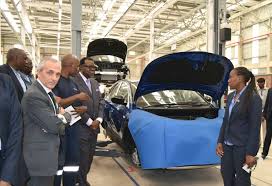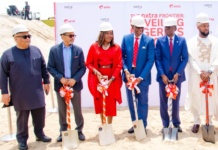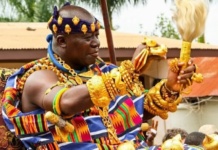The Namibian government’s commitment and effort to attract foreign direct investment was reaffirmed when President Hage Geingob took the first locally assembled Peugeot 5008 on a test drive.

The historic event took place at Walvis Bay yesterday morning.
Geingob, who was visibly pleased with the establishment of the first ever vehicle assembly plant in the country, said this development underscored industrial development, regional value chains and affirmed Namibia as a regional gateway to southern Africa, which boats 300 million people.
The plant, known as Peugeot Opel Assembly Namibia, is a joint venture between French company Groupe PSA who own 51 percent, and Namibia Development Corporation (NDC), which holds the remaining 49 percent on behalf of the Namibian government.
So far 15 vehicles have been assembled at the plant, which plans to eventually produce 10 000 vehicles per year. The plant currently employs 50 people of which only five are foreigners.
The vehicles are both for the local and international markets.
Officially inaugurating the assembly plant yesterday, Geingob said the feat signals Namibia’s ambition to become one of the premier destinations for foreign direct investment in Africa.
“We failed in the past but I don’t know how we succeeded this time around. It was not easy to meet the conditions but our hard work has finally paid off,” an ecstatic Geingob said, to thunders of applause.
According to the president, the automotive industry is one of the sectors identified in the Growth at Home Strategy as a priority sector and that by attracting investment into automotive space, Namibia will help diversify her economy and support her ambitions to become a regional gateway that offers a stable political and economic environment for multinationals such as Peugeot-Opel, to establish regional headquarters and manufacturing facilities.
President Geingob added that government’s objective since independence was to create conditions necessary for increased investment and developing of a competitive industrial sector.
“We have intensified efforts to promote local value addition and strengthening of forward and backward linkages within the Namibian economy. Hence the assembly plant is not only significant for the Erongo Region and Walvis Bay but for the rest of Namibia as it further amplified the country’s national development aspirations… ” Geingob explained.
Namibians should be mindful of the fact that government’s efforts to attract foreign direct investment to Namibia’s shores are not merely for the purpose of establishing factories, but these investments should buttress efforts to boost local enterprise development and increase the entry and participation of emerging and existing businesses into the mainstream economy, he urged.
He explained that Namibia is still faced with the triple challenge of severe pockets of poverty, unemployment and unequal distribution of income.
This, he said, are the lingering legacies of the country’s past, which was characterised by the politics of structural economic exclusion, among others.
“Sustained and shared economic development is viewed as [a] measure to redress imbalances of the past and eradicating these scourges from the fabric of our society,” he told the gathering at the west coast harbour town.
“Hence, it is our hope that the Peugeot Opel Assembly Namibia Plant will be a project that will bolster the diversification strategy set out in our growth at home strategy.”
“We expect our local small and medium enterprises to incur benefit from this investment, further enabling Namibia to realise the positive externalities and spill-overs [of] this investment,” he said.
Kindly follow us on twitter:@AfricanVoice2









